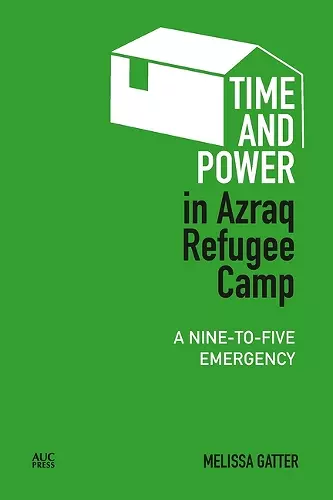Time and Power in Azraq Refugee Camp
A Nine-to-Five Emergency
Melissa Gatter author Dr Dawn Chatty editor Dr Stacy D Fahrenthold editor Dr Annika Rabo editor
Format:Hardback
Publisher:American University in Cairo Press
Published:7th Mar '23
Should be back in stock very soon

WINNER OF THE 2023 ALIXA NAFF PRIZE IN MIGRATION STUDIES
The politics and governance of Jordan’s Azraq camp for Syrian refugees
Azraq refugee camp, built in 2014 and host to forty thousand refugees, is one of two official humanitarian refugee camps for Syrian refugees in Jordan. Time and Power in Azraq Refugee Camp investigates the relationship between time and power in Azraq, asking how a politics of time shapes, limits, or enables everyday life for the displaced and for aid workers.
Based on ethnographic fieldwork, carried out during 2017–2018, the book challenges the perceptions of Azraq as the ‘ideal’ refugee camp. Melissa Gatter argues that the camp operates as a ‘nine-to-five emergency’ where mundane bureaucratic procedures serve to sustain a power system in which refugees are socialized to endure a cynical wait—both for everyday services and for their return—without expectations for a better outcome.
Time and Power in Azraq Refugee Camp also explores how refugees navigate this system, both in the day-to-day and over years, by evaluating various layers of waiting as they affect refugee perceptions of time in the camp—not only in the present, but the past, near future, and far future.
Far from an ‘ideal’ camp, Azraq and its politics of time constitute a cruel reality in which a power system meant to aid refugees is one that suppresses, foreclosing futures that it is supposed to preserve.
“[C]ontributes significantly. . . . a profound effort. . . . Time and Power in the Azraq Refugee Camp is not only a valuable resource for academics and politicians, but it also serves as a powerful call to action for reinventing how we address displacement and crises in the modern world.”—Emrah Atar, International Migration Review
"Time and Power offers a two-fold contribution to anthropology, migration studies, and international relations. In fields characterized by theoretical work on time and temporality that is highly abstract, Gatter’s ethnography of everyday life in Azraq Refugee Camp (Jordan) stands out, first and foremost, for its rich, empirical account of the lived temporalities of displacement and their politics."—Mirko Palestrino, International Studies Review
"The directness of the narrative makes the book an invaluable teaching tool, highlighted by poignant observations. . . . This book stands as a critical academic resource. Authored by a writer of Northern origin who masterfully adopts a Southern viewpoint, it not only enriches the discourse but also challenges conventional assumptions about the so-called future of camps."—Hala Ghanem, Journal of Refugee Studies
"Students of humanitarianism, refugee studies, the Middle East, and cultural anthropology will benefit from the ethnography’s eclectic but focused examination of refugee temporality in the encamped borderlands of Jordan . . . . Through her deft interplay between anthropological concepts of temporality and bureaucracy, Melissa Gatter offers readers a nuanced, creative, and widely adaptable approach to thinking about experiences of time within totalizing institutions."—Malay Firoz, Middle East Journal
"How does time pass in a refugee camp? This seemingly straightforward question is at the heart of Melissa Gatter’s wonderful ethnography of refugee lives and aid regimes in Azraq camp in Jordan. Her focus on tempo, pace, and time opens up the multi-faceted world of street-level-humanitarian bureaucracy, hope and despair in ongoing displacement, and people’s desires for ordinary futures."—Ilana Feldman, George Washington University
"Encompasses wide-ranging ethnographic material with excellent, equally outstanding theoretical analysis. I have rarely been so immediately and deeply taken by a book as this one."—Sophia Hoffmann, University of Erfurt
"In this detailed ethnography of temporal bordering practices in the Azraq Refugee Camp, Melissa Gatter offers valuable insights into the everyday bureaucracy, affects, future imaginaries, and resilience among exiled Syrians. Time and Power in Azraq Refugee Camp is a notable contribution to contemporary studies on forced displacement, camps, and temporality. Gatter’s book is also a contribution to the growing literature on forced migration in Western Asia."—Shahram Khosravi, Stockholm University
ISBN: 9781617970979
Dimensions: unknown
Weight: unknown
200 pages